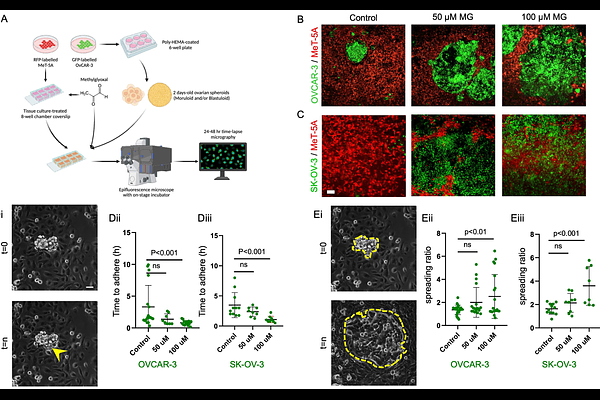Dicarbonyl stress debilitates mesothelial defense against metastasizing ovarian cancer

Dicarbonyl stress debilitates mesothelial defense against metastasizing ovarian cancer
Mishra, S.; Vidhipriya, K.; Gopikrishnan, A.; Mishra, S.; Prasanna, C. V. S.; Bhat, R.; Sen, P.
AbstractChronic metabolic disorders and aging result in accumulation of active dicarbonyls that glycate biomolecules rendering them dysfunctional. Although metabolic aberrations are known to be epidemiologically associated with faster cancer progression, cell biological determinants of such associations remain elusive. The formation of micro-metastases in epithelial ovarian cancer involves its colonization of visceral peritonea through clearance of mesothelia that line the coelom. In this study, we observe that cocultures of immortalized human coelomic MeT-5A mesothelia with human ovarian cancer cells OVCAR-3 and SK-OV-3 show greater infiltration by the latter when exposed to increasing concentrations of the dicarbonyl methylglyoxal (MG). Treatment with increasing concentrations of MG caused death and senescence within human and murine serosal mesothelia. Cells showed higher levels of advanced glycation end products, dysregulated occludens junction protein ZO-1, and disrupted localization of cortical filamentous actin and its regulator ezrin, indicating poor inter-cell adhesion. Time lapse imaging also showed impaired migration for MG-treated single mesothelia and for their collective monolayers. Agent-based computer modeling of coculture dynamics predicted that a combined effect of confluence and migration allows inter-adherent mesothelia to contain the spread of colonizing cancer cells, which was confirmed through coculture time lapses of cancer colonization within higher and lower mesothelial densities. We found ovarian cancer cells showed higher levels of glyoxalase-1 (GLO-1) enzyme, which catabolizes MG, suggesting how they escaped its cytotoxic effects. Consistent with this, treatment of OVCAR-3 with MG concurrently with pharmacological inhibition of GLO-1 showed greater cell death. Our results suggest dicarbonyl stress helps colonizing cancer cells overcome the resistance of natural homoeostatic barriers and its inhibition may, in supplementation with chemotherapy, stem metastasis.